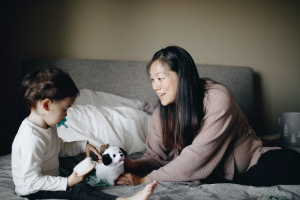
Why is play important in our children’s early childhood stages?
Studies show that there are many benefits for our children when they engage in play. For example, play improves our children’s cognitive skills and even social and emotional skills.
One way you can encourage play is to play together with your child. It is a fun and meaningful way to strengthen the relationship between parent and child too! So here are some tips to help you make the most of playtime with your child.
Watch and Learn

When playing with your child you should give your child more free rein. We should let them explore and let their ideas flow instead of directing them on how they should play.
For example, if your child wants to play with Jenga blocks by building buildings and landscapes instead of playing with it the traditional way, then let them. There is no need to make them conform to the rules of the initial game.
This encourages your child to be more creative and you also learn more about their interests which will improve your bond with your child. For example, you might realise that your child prefers to play with farm animal figures instead of robots.
Follow your Child’s Lead

The single most important factor in play is following your child’s lead. Allow your child to choose an activity, and let them decide how long they want to spend on the activity. If your child wants to play with a friend, offer them toys or objects to play with together.
Give your child the opportunity to make decisions during their play without interfering much. This helps them to feel more secure and confident. It also lets them explore their world and feel like they have some control over the happenings around them.
Provide Enough Toys

When your child engages in play, toys are one of the tools they use to make their play more fun and engaging. And there are so many options out there for you to purchase for your preschooler.
Alternatively, there are also ways to use recycled materials to create cheap and simple, yet fun and engaging!
Here are a few examples of homemade preschool toys:
1. Play balls: This could be anything from stress balls to basketballs. Anything works as long as you can play catch with your child. Let your child throw the ball back and forth from one hand to another or try catching with a bowl on their head. Just make sure that it is not hard like golf balls and not a choking hazard.
2. Baking soda painting: Mix baking soda with water, place it in an empty squeeze bottle and add some food colouring for an instant paint set. You can also add glitter to add some sparkle to the paint! This allows your child to experiment with colours while getting accustomed to handling different tools.
Be Patient with Your Child

Sometimes, when our children play, we might feel bored. After all, the simple toys and giant jigsaw puzzles offer little stimulation to us parents. So one way is to let your child lead in play (refer to second point).
Let them discover new things like new games or new ideas and play at their own pace.
Another thing to note is if your child plays with a peer and is unwilling to share their toys or items like colouring pens, don’t force them to share. Although it is good to teach your child values like generosity, forcing them does more harm than good.
It does not teach them social skills and it doesn’t give them the safe space to learn and interact with others because the sharing becomes a negative experience to them.
So just be patient and let your child share when they are ready, not when you force them to.
Be a Good Listener

When it’s time to play, the last thing you want to do is stick your earbuds in or focus on something else like your phone.
Listening attentively without being distracted is a great way to show your child that you’re interested in what they have to say and that you’re willing to help them. When your child is talking, listen to what they say and don’t divert the conversation.
For example, if your child is talking to you about LEGOs, give them your full attention. Don’t multitask, just look them in the eyes while they are talking.
This shows them that you are paying attention to what they are saying and that you are invested in their interests too.
Don’t Force Play Instead, Guide and Shape it

When your child is playing, it’s important not to force their imagination or creativity in any direction. Instead, let them lead. Try asking your child questions like, “What do you want to play?” or “What do you want to be when we play?”
By allowing your child to take control of the playtime activities, they will feel empowered and encouraged to exercise their creativity. This is also a helpful way to shape playtime and get a sense of what your child may be interested in learning.
Have Fun

One thing that’s true about children is that they love to play. Children are always on the go. Whether you’re playing with your child indoors or outdoors, remember that the most important thing is to have fun.
The best thing to do is let them have fun and get messy sometimes. Children are curious and want to explore their world and your home by tasting, smelling, touching, and even stomping on things.
Let them enjoy the experience of messy play. You can let them play in the mud and create different items. Allowing children to get dirty is a great way to teach them about their world.
Conclusion

Play is the ultimate vehicle for connection between you and your child, so use it. Playing with your preschooler isn’t just fun, it’s an important way to connect and bond.
Playing also provides a safe space for children to work through their feelings and problems as they happen in real-time. Not to mention, playing together makes you and your child feel good.
Importance of Play in Early Childhood Education
How a Play Based Approach Can Advance Your Child’s Gross Motor Skills
